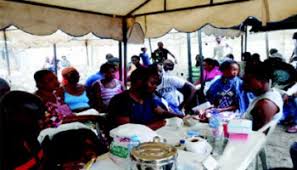The UNODC and its partners officially opened the community based drop-in and counselling centre at the Mabushi District of Abuja on Wednesday.
The centre was established with funding support from the EU under the “Response to Drugs and Related Organised Crime in Nigeria’’ project.
The Deputy Representative of UNODC in Nigeria, Elizabeth Bayer, said that the programme was in response to the gap analysis done in the research between 2016 and 2018.
She explained that the research revealed that female drug users were not accessing treatment as readily and often as male drug users in the community, hence the need to establish a centre that would attend to them.
“We have a project that is funded by the European Union on drug trafficking and abuse, it has a number of pillars, but one strong pillar is on drug demand reduction so what we are doing is in line with that.
“We do this a lot to NGOs, here we are also, supporting the Centre of Rights to Health to establish such a centre for women.
“Particularly, female drug abusers are at the core of our concern because they are often neglected in other projects.
“In many other treatment centres, it is the men who come. Women are not just coming there.
“So here, we have a centre that is specifically dedicated to women where women are really accessing and actually getting the services of support on drug abuse and prevention,’’ Bayer said.
Bayer commended the CRH for executing the project and identifying the most vulnerable groups, who are in need of treatment and counselling to prevent illicit use of drugs.
In his remarks, Richard Young, Deputy Head of Delegation of the EU to Nigeria, lauded the initiative, which he described as a way in the right direction to tackle the menace of illicit drug use and abuse.
Young said that beyond statistics and reports, the testament of rehabilitated persons indicated a success in the project of addressing the use of illicit drugs.
Dr. Stella Iwuagwu, Executive Director, CRH, said that the Drop-in centre was a refuge for vulnerable women who used drugs and a place where they could get treatment and counselling.
Iwuagwu said that before the official opening of the centre, no fewer than 80 women in Mabushi had benefited from CRH’s services.
She said the services, which included treatment, HIV screening and counselling, psychosocial support, sensitisation, among others.
According to her, with the official opening of the centre, more women in Mabushi area and Abuja can get help, healing from trauma and addiction and transform their lives.
She said that against criminalising drug users, CRH helped them work through their challenges to help them solve their problems to make them better people.
Iwuagwu called for the collaboration of more agencies, governments and NGOs to support the sustainability of the centre beyond the one-year support from the EU/UNODC.


